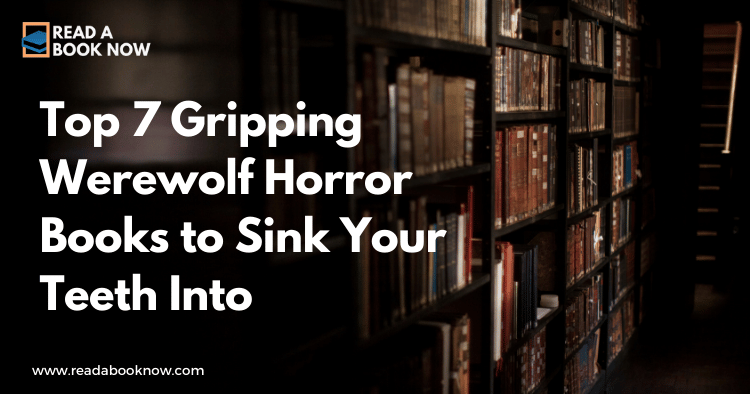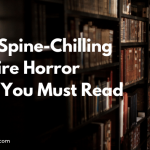Table of Contents
- Introduction
- 1. “The Wolf Gift” by Anne Rice
- 2. “Bitten” by Kelley Armstrong
- 3. “Red Moon” by Benjamin Percy
- 4. “Shiver” by Maggie Stiefvater
- 5. “The Last Werewolf” by Glen Duncan
- 6. “Moon Called” by Patricia Briggs
- 7. “Wolf Moon” by Charles de Lint
- Conclusion
- FAQs
Introduction
Werewolves have long captivated horror enthusiasts with their blend of monstrous transformation and tragic humanity. From classic literature to modern thrillers, the werewolf mythos has evolved, offering readers a myriad of perspectives on this compelling creature of the night. In this article, we’ll explore seven gripping werewolf horror books that will leave you breathless and begging for more. So, grab a cozy blanket and prepare for some spine-chilling tales!
1. The Wolf Gift by Anne Rice
Anne Rice, known for her exquisite vampire novels, takes a daring leap into werewolf territory with “The Wolf Gift.” This contemporary tale follows the journey of Reuben, a young journalist who is bitten by a mysterious creature in the coastal town of Nideck Point. As he grapples with his new identity, the novel explores themes of power, morality, and the search for redemption.
Rice’s prose is elegant and evocative, drawing readers into a world where the line between human and beast is tantalizingly blurred. The book is not just a horror story; it’s a poignant exploration of what it means to be truly alive.
Key Themes:
- Transformation and Identity
- Good vs. Evil
- Redemption
2. Bitten by Kelley Armstrong
“Bitten” is the first installment in Kelley Armstrong’s Women of the Otherworld series. It introduces us to Elena Michaels, the world’s only female werewolf, who struggles with her dual nature. The novel is a thrilling blend of romance, horror, and fantasy, as Elena attempts to reconcile her human side with her animal instincts.
Armstrong’s character development shines in this novel. Readers root for Elena as she navigates the complexities of pack life, love, and self-acceptance. The plot is packed with action, mystery, and a touch of humor, making it a must-read for fans of werewolf fiction.
Key Themes:
- Feminism and Empowerment
- Pack Dynamics
- Love and Loyalty
3. Red Moon by Benjamin Percy
Benjamin Percy’s “Red Moon” offers a fresh take on the werewolf horror genre by intertwining it with political and social commentary. In a world where werewolves exist openly, the narrative explores the societal fears and prejudices surrounding them.
The story follows a diverse cast of characters, including a werewolf on the run and a young soldier facing a moral crisis. Percy’s writing is taut and suspenseful, making it a thrilling read that prompts deeper reflection on humanity’s darker instincts.
Key Themes:
- Prejudice and Fear
- The Nature of Humanity
- Survival and Conflict
4. Shiver by Maggie Stiefvater
Maggie Stiefvater’s “Shiver” is a beautifully written love story that incorporates werewolf lore in a unique way. The story revolves around Grace, a girl who has always watched the wolves in the woods behind her home, and Sam, a boy who transforms into a wolf during the colder months.
This haunting tale explores the themes of love, loss, and the impact of the changing seasons on both nature and the heart. Stiefvater’s lyrical prose and emotional depth make “Shiver” a standout, transcending the typical horror genre.
Key Themes:
- Love and Sacrifice
- Nature and Change
- The Passage of Time
5. The Last Werewolf by Glen Duncan
In “The Last Werewolf,” Glen Duncan delivers a dark and visceral narrative that follows Jake, the last of his kind, as he evades hunters determined to end his existence. This novel is as much a character study as it is a horror story, delving into themes of loneliness, existentialism, and the primal nature within us all.
Duncan’s writing is raw and poetic, capturing the essence of a creature living in a world that fears him. The book challenges readers to confront their own humanity as Jake navigates a life filled with violence and desire.
Key Themes:
- Loneliness and Isolation
- The Nature of Humanity
- Desire and Violence
6. Moon Called by Patricia Briggs
“Moon Called” kicks off Patricia Briggs’ Mercedes Thompson series, where the titular character, a mechanic and shapeshifter, finds herself embroiled in the supernatural underworld. This book is rich in lore, featuring not only werewolves but also fae and vampires, creating a complex and immersive world.
Briggs masterfully blends action, mystery, and humor, with a strong female protagonist who is relatable and fiercely independent. “Moon Called” is the perfect blend of adventure and horror, making it a standout in the genre.
Key Themes:
- Female Empowerment
- Supernatural Lore
- Friendship and Loyalty
7. Wolf Moon by Charles de Lint
Charles de Lint’s “Wolf Moon” is a mesmerizing tale that combines elements of folklore and urban fantasy. Set in the vibrant landscape of Newford, the story follows several characters whose lives intersect during a wolf-centric festival.
De Lint’s writing is lyrical and enchanting, weaving together themes of community, mythology, and the bonds that connect us to nature. This book offers a different flavor of werewolf story, focusing more on the mystical than the monstrous.
Key Themes:
- Community and Connection
- Mythology and Folklore
- Nature and Spirituality
Conclusion
Whether you’re drawn to the raw horror of transformation, the complexities of identity, or the emotional depth of love and loss, these seven werewolf horror books offer something for everyone. Each author brings a unique perspective to the genre, ensuring that your reading experience will be as thrilling as it is thought-provoking. So, grab one—or all—of these titles, and prepare to sink your teeth into some unforgettable tales!
Also look for insights on the evolution of horror literature, particularly in the werewolf genre, in articles like Top 7 Ancient Classics Everyone Should Read Today where classic themes often find their way into modern storytelling.
FAQs
Q: What makes werewolf stories appealing?
A: Werewolf stories appeal to readers for their exploration of the duality of human nature, the tension between civilization and primal instincts, and the thrilling transformation that often serves as a metaphor for personal growth.
Q: Are there classic werewolf books?
A: Yes, classic werewolf literature includes works like “The Werewolf” by Clemence Housman and “The Wolf Man” by Guy Endore, which set the foundation for modern werewolf tales.
Q: Is there a difference between werewolf fiction and werewolf horror?
A: While both involve werewolves, horror specifically emphasizes the frightful and monstrous aspects of werewolf lore, often incorporating elements of suspense and fear.
For further reading on werewolf lore, you can check out The Encyclopedia of Mythology for in-depth insights into the myths and legends surrounding these fascinating creatures.
Happy reading! 🐺📚




